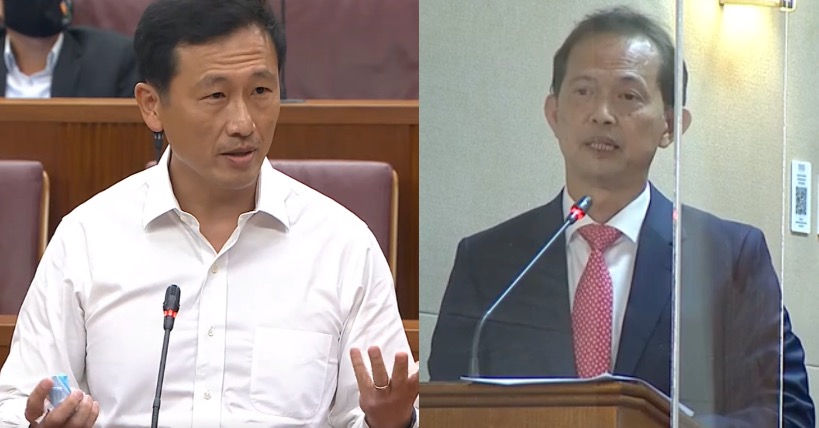Foreign workers, particularly in the financial sector, were the subject of a testy exchange between Non-Constituency Member of Parliament Leong Mun Wai of the Progress Singapore Party (PSP), and two members of the People's Action Party (PAP).
In his speech, Leong said there is an "urgent need to rebalance" the mix of local and foreign workers in the job market.
He added that foreign workers currently comprise about 40 per cent of the workforce "at all levels", although he did not cite a source for this.
He also said, "And many foreign workers have even taken the helm of our local companies."
Leong suggested that the government could impose an immediate monthly levy of S$1,200 on all Employment Pass (EP) holders, in order to "level the playing field".
This, he said, would differentiate the "true" high-salaried foreign talents from cheap labour that "competes unfairly" with Singaporeans to the apparent detriment of the economy.
MOS Gan Siow Huang asks for clarification
Minister of State for Manpower Gan Siow Huang then sought a clarification after Leong finished his speech.
She said that the government regularly reviews the qualifying criteria for EP holders, and this fulfils the aim of constant rebalancing of the local and foreign talent mix, and strengthens the Singaporean core.
She then referred to an earlier speech of Leong's, where he "lamented" that DBS bank did not have a "homegrown" CEO.
Gan said that Leong "maintained his position" even after the clarification that DBS' current CEO Piyush Gupta is a Singaporean who was born in India. She added:
"I cannot help but come to the conclusion that Mr Leong and the PSP do not believe that Singapore should be an open city connected to the world, having locals and foreigners complementing each other. And he wants Singapore to close up, for the top jobs to be given to Singaporeans only.
Mr Speaker, we have seen in many other mature democracies, where anti-foreigner sentiments are being played out and politicised. And we also know that many countries are grappling with the challenges of globalisation.
So are we. But we must try to strike a balance between globalisation and building our own identity in Singapore, welcoming foreign talent and building our own talent at the same time. And our future depends on it."
She said that if companies are told they can invest in Singapore but can only employ Singaporeans for the top jobs, some of them may be discouraged from doing business here.
This would lead to an overall loss in available jobs in Singapore.
Furthermore, Singaporeans working overseas would not be employed in top positions if the same logic was applied elsewhere.
Leong Mun Wai on localisation
Leong responded that PSP is in "total agreement" that Singapore is an open and global city, and the party is in favour of having foreign talent complementing local workers. However, he said that his party feels that the required "rebalancing" is going too slowly.
He added that foreigners taking top positions in companies is "not a problem", but rather, the question is whether there are enough policies to ensure fair treatment.
He referred to the mention of DBS's CEO in his earlier speech, and said that it was not a personal attack.
Rather, Leong clarified, he wanted to emphasise that there was no "succession planning".
Leong drew from his personal experience of working in local and overseas banks during the 1980s and 1990s, saying that at the time, localisation in the financial sector was "almost a must".
He said that these days, however, it does not even seem to be a "KPI (Key Performance Indicator)" for the Monetary Authority of Singapore (MAS).
Gan gave a short reply to Leong, saying she understood that a segment of Singaporeans supported PSP’s position, and that the PSP taking that position was part of having diverse views in Parliament.
However, she said that the government sees the issue as a “difficult balancing act” that it is constantly working on.
Ong Ye Kung: No such menu
Transport Minister Ong Ye Kung, who is also a board member of MAS, also rose to respond.
He also referred to Leong's earlier speech, recalling an exchange between Leong and himself, where he detailed MAS's efforts over the years to establish a financial hub and creating jobs for Singaporeans in the financial sector.
Ong said everyone wished they had a "menu" where Singapore could get all the jobs without the competition, but, said that "I'm sorry, there's no such menu."
He said Singapore chose to open up, with more competition but also building capabilities, and being able to "seize more opportunities".
Having had that exchange previously, Ong said that he was a "little bit disturbed" to hear Leong's "grandstanding" that all the efforts toward localisation and building our own talent were not within MAS's KPIs,
Ong said this is "grossly unfair" and ignores the previous discussion.
Leong apologised
Leong then apologised, acknowledging that MAS may have such KPIs. However, he opined that they were "not showing enough results".
He posed two questions to Ong:
- Why are 30 to 40 per cent of the senior executive positions in the retail banking sector held by foreigners? (Here, Leong referred to data quoted by Ong in their previous exchange)
- Has the government created a "wage disadvantage" for Singaporean workers, as foreign workers do not have mandatory CPF contributions?
Ong replied that 30 per cent of retail bank managers are foreigners as Singapore is a global financial centre, and that local workers make up 70 per cent of what is a "much larger pie", the essence of an open and international financial sector. He then said:
"So I think I also come to the same conclusion as MOS Gan Siow Huang, that actually the PSP position is that, I think you want Singapore to close up and protect the jobs, which is fine. (They're) entitled to that view.
But I think the government and MAS has a different view. But thank you for your apology and we understand, and apology accepted."
Related story:
Top image from CNA video.
If you like what you read, follow us on Facebook, Instagram, Twitter and Telegram to get the latest updates.

